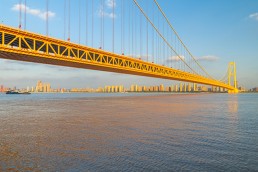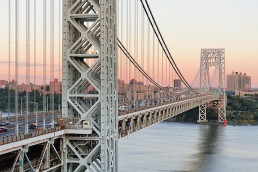© Pedro Ribeiro SimõesTagus River Bridge 1966
Tagus River Bridge 1966
The Bridge
The Ponte 25 de Abril is the only route into the city of Lisbon from the south over the Tejo Estuary. It is named after the Portuguese Carnation revolution of 25 April 1974. It was previously known as the Salazar Bridge, and is often referred internationally as the Tagus River Bridge. It was designed and built by American firms and features a stiffened-truss deck with similarities to the Golden Gate Bridge.
In the 1990s the city authorities planned the addition of two carriageways and a rail crossing using the superstructure of the original road bridge. A double-track railway now runs on a lower platform within the stiffening truss. The reconfiguration of the structure required reinforcement, including a second set of main cables. Bill Brown and his colleagues at Brown Beech were consultants to American Bridge Company and the Steinman, Boynton, Gronquist & Birdsall firm on the cable spinning, carried out on the operational suspension bridge.
In 1998 the Vasco de Gama Bridge was opened to the east to relieve some of the city’s traffic congestion.
Tagus River Bridge
Also known as Ponte 25 de Abril
Key Facts
Motorway and rail bridge
54,196km of cable was used
Train platform added in 1999
Location
Lisbon, Portugal
Across the Tagus River at the Tejo Estuary
Between Lisbon (north bank) and Almada (south bank)
Designers / Engineers
Steinman, Boynton, Gronquist & London
Description
Suspension bridge
1,013m main span
2,277m total length
Main contractors
T. Y. Lin International
American Bridge Company
Construction
Began 1962
Opened 6 August 1966































































